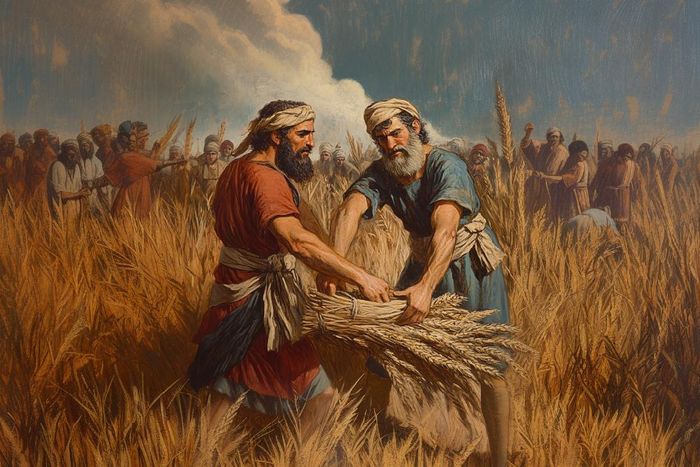Two Southern Tribes of Israel: Journey Through the Divided Kingdom
Delve into the tumultuous era of the Divided Kingdom and the legacy of Judah and Benjamin—the two southern tribes of Israel.
Published December 8, 2024.

When the great kingdom of Israel fractured, two southern tribes—Judah and Benjamin—found themselves bound together by more than just geography, forging a resilient partnership that would preserve their cultural and religious identity in the face of increasing external threats.
United by their loyalty to Jerusalem, their shared commitment to the Temple, and their determination to maintain the Davidic lineage, these tribes became a testament to survival, faith, and unexpected solidarity.
Israel Divided: A Historical Perspective
King Solomon’s oppressive taxes and forced labor, combined with tribal rivalry, created tensions among the Israelites. When Solomon died in around 931 BCE, his son Rehoboam’s harsh rule pushed ten of the northern tribes to rebel. This led to the division of the kingdom (1 Kings 12:1-24).
The ten northern tribes, under Jeroboam’s leadership, formed the Northern Kingdom of Israel. The remaining two tribes, Judah and Benjamin, stayed loyal to Rehoboam and formed the Kingdom of Judah (2 Chronicles 11:1-12). For the next 57 years, the kings of these two kingdoms were enemies (Constable’s Notes on the Book of Kings).
» Dive deeper into the fascinating facts about the Holy Land
Differences Between the Southern and Northern Kingdoms
The Northern Kingdom of Israel, centered in Samaria and under various dynasties, faced political instability. To assert independence from Judah, Jeroboam established a new religious system blending pagan and Israelite elements. He built rival worship centers in Bethel and Dan.
The Southern Kingdom of Judah, centered in Jerusalem, maintained the Davidic monarchy and upheld biblical covenants. While more stable, it faced governance challenges. Religiously, Judah stuck to temple worship in Jerusalem, following Mosaic Law and priestly traditions.
» Plan your pilgrimage with our guide to Jerusalem
Understanding the Southern Tribes of Israel
The two southern tribes of Israel were Judah and Benjamin, who together formed the Kingdom of Judah. They played distinct roles, both geographically and symbolically.
Judah, the larger and more dominant tribe, was historically linked to King David and the messianic line (Genesis 49:10). Benjamin, the smaller but still significant tribe, contributed important figures like King Saul (1 Samuel 9:1-2).
The Bible portrays Judah and Benjamin as unwavering in their covenant with God, exemplifying loyalty and resilience. Judah, the royal tribe, inherited the promise of Davidic kingship and messianic hope. Benjamin, a warrior tribe skilled in archery and left-handed fighting, shows courage and faith, producing figures like Saul, Esther, and Mordecai.
Their stories emphasize faithful leadership, reliance on God, and steadfastness in trials. Judah's story highlights the blessings of faith-driven leadership, as seen in David, and the consequences of pride and disobedience. Benjamin's story reveals resilience, courage, and redemption, highlighting God's power to restore and guide.
4 Kings of the Southern Kingdom
The Southern Kingdom of Judah had four important kings: David, Solomon, Hezekiah, and Josiah. All of them belonged to the Davidic line, a dynasty founded by King David.
1. King David
King David was the second king of Judah. He played a pivotal role in unifying the kingdoms of Israel and Judah. He also made Jerusalem the capital of the united kingdom, calling it "The City of David" (2 Samuel 5:6-10)—located on a narrow ridge south of the present-day Old City.
The Bible describes King David as "a man after his own heart" (1 Samuel 13:14), signifying his faithfulness to God despite his mistakes. He set a high standard for future Judean kings. Importantly, God promised that David's descendants would always have a place on the throne (2 Samuel 7:16).
This promise, known as the Davidic covenant, became central to the messianic hope of the Jewish people. For the tribes of Judah and Benjamin, David's lineage symbolized stability, divine favor, and the future coming of a messiah. The New Testament identifies Jesus as a descendant of David (Matthew 1:1-17).
» Walk in Jesus' footsteps: Explore meaningful events that shaped His life
2. King Solomon
King Solomon, David's son and the third king of Judah, was renowned for his wisdom and wealth. He is most famous for building the First Temple in Jerusalem (1 Kings 6), a magnificent structure that served as a center of worship for the Israelites.
Solomon's reign ushered in a golden age for Judah, marked by peace and prosperity. But, his religious practices were later corrupted by foreign influences (1 Kings 11:1-13). Despite this, the temple he built remained a powerful symbol of God's presence and covenant with Judah.
» Did Jesus travel further? Explore the countries He may have visited
3. King Hezekiah
King Hezekiah is famous for his religious reforms. He restored the worship of God and purged Judah of idolatry (2 Kings 18:1-6). During an Assyrian siege, he showed his faith in God, leading to Judah's deliverance (2 Kings 19:35-36).
His reign was a time of spiritual renewal for Judah, and his reforms helped to preserve the kingdom's religious identity. He also oversaw the construction of the Siloam Tunnel, a remarkable feat of engineering that provided a water source for Jerusalem (2 Chronicles 32:2-4).
» Deepen your Biblical knowledge of Ezekiel and the Cherubim
4. King Josiah
King Josiah's reign was marked by a rediscovery of the Law during temple repairs (2 Kings 22:8-13). He emphasized the importance of the Law in Judean life and instituted religious reforms to follow its teachings (Hebrew Annual Review 10 (1986):37-62).
His reforms also included a purge of idolatry (2 Kings 23:21-23). While Josiah's reforms helped to preserve Judah's spiritual heritage, his untimely death weakened the kingdom and contributed to its eventual fall. Despite this, his reign famous for righteous leadership.
3 Events That Shaped the Southern Tribes of Israel
1. The Assyrian Siege of Jerusalem (701 BCE)
During King Hezekiah's reign, the powerful Assyrians, led by Sennacherib, besieged Jerusalem. Hezekiah strengthened the city's defenses, built the Siloam Tunnel to secure water supplies, and prayed for God's help.
While the Assyrians conquered nearby cities, Jerusalem remained unconquered (2 Kings 19:35-37). This event highlighted the importance of both military preparedness and faith in God's protection for Judah (Lachish reliefs; Sennacherib's Prism).
» Explore the symbolism of anointing in the Bible
2. The Babylonian Exile (597-538 BCE)
In 597 BCE, the Babylonian king Nebuchadnezzar II destroyed Jerusalem and the First Temple. Following Babylonian custom, he deported a significant number of Jews (scholars estimate around 10,000) – known as the Babylonian Captivity.
These were primarily prominent citizens: skilled workers, priests, and the wealthy. This exile was devastating. Judah lost its political independence (ending in 586 BCE) and its central place of worship (2 Chronicles 36:15-20). But, the exile also reshaped Jewish identity.
Synagogues emerged as new centers of worship, and the focus shifted towards studying the Torah. Additionally, the exile strengthened the belief in a future messiah who would restore the Davidic line.
3. The Return from Exile and the Second Temple (539 BCE)
During the Babylonian Captivity, the Persian Empire conquered Babylon. King Cyrus the Great issued an edict allowing the exiled Jews to return to their homeland (Cyrus Cylinder; 2 Chronicles 36:22-23; Ezra 1:1-4).
This event marked the beginning of rebuilding Jerusalem and the Second Temple. The Second Temple's completion in 516 BCE symbolized both physical and spiritual revival for Judah. But, new challenges awaited with the rise of Alexander the Great's Greek Empire.
» Explore the Biblical significance of Nebuchadnezzar's dreams
Downfall of the Southern Kingdom of Judah
The Southern Kingdom's decline was a result of several interconnected factors. Disobedience to God's law led to moral decay, social injustice, and a decline in true worship. Prophets like Jeremiah and Ezekiel warned of the consequences of this disobedience.
Corrupt and idolatrous leadership further weakened the kingdom's spiritual foundation. The Southern Kingdom stood between powerful empires like Assyria and Babylon, who sought to expand their territories.
The Babylonian invasion and subsequent exile were the final blow, destroying Jerusalem and the Temple.
The exile was a significant turning point. While it was a devastating event, it also led to a period of spiritual renewal and a deepened commitment to God's covenant. The two southern tribes, Judah and Benjamin, faced immense challenges:
- The loss of their homeland
- The rebuilding of their society
- The constant struggle to maintain their identity in a foreign land
» Discover surprising facts about Mount Hermon
The Enduring Legacy of Judah and Benjamin
The two tribes of Judah and Benjamin played a crucial role in shaping Jewish identity and religious practices that are still significant today. Judah's connection to the Messiah, as foretold in Genesis 49:10, remains central to Jewish messianic expectations. Benjamin, known for its warriors and loyalty, is seen as a symbol of perseverance and resilience.
The challenges faced by these tribes, particularly during the Babylonian Exile and the Hellenistic period, led to the development of Jewish resilience, adaptability, and a strong sense of cultural and religious identity. These experiences influenced the development of practices like Torah study and synagogue worship, which remain fundamental to Jewish life.
» Dive deeper into the connection between John the Baptist and Jesus
Sources for Learning About the Southern Kingdom
These sources offer valuable insights into the history and culture of the Southern Kingdom and its tribes:
- The Cyrus Cylinder: This ancient artifact confirms King Cyrus the Great's decree allowing the exiled Jews to return to their homeland, a pivotal moment in their history.
- The Book of Maccabees: These texts detail the Maccabean Revolt and the rededication of the Second Temple, events that led to the celebration of Hanukkah.
- Annals of Sennacherib (Taylor Prism): This artifact provides an Assyrian perspective on the siege of Jerusalem during Hezekiah's reign, offering a different viewpoint on this significant historical event.
- Josephus' Antiquities of the Jews: This work by the Jewish historian provides a comprehensive account of Jewish history, including the Babylonian Exile, offering context and details about the political, social, and religious landscape of the time.
» Learn who were the two thieves crucified alongside Jesus
Judah and Benjamin: A Divided Legacy
The story of the two southern tribes of Israel, Judah and Benjamin, is a tale of resilience, faith, and, ultimately, exile. Despite the tumultuous backdrop of the divided kingdom, these tribes clung to their heritage and their covenant with God. Both righteous kings and corrupt leaders, periods of prosperity and times of hardship mark their history.
Through it all, the thread of God's promises remained a beacon of hope in the midst of adversity. While the kingdom of Judah eventually fell to the Babylonian Empire, the legacy of these two tribes endures, shaping the course of Jewish history and inspiring generations to come.
As you ponder the trials and triumphs of Judah and Benjamin, consider a gift that reflects the enduring spirit of these ancient tribes. From handcrafted jewelry to exquisite home decor, each Artza piece tells a story. Choose a gift that honors tradition and evokes the timeless beauty of the region.














